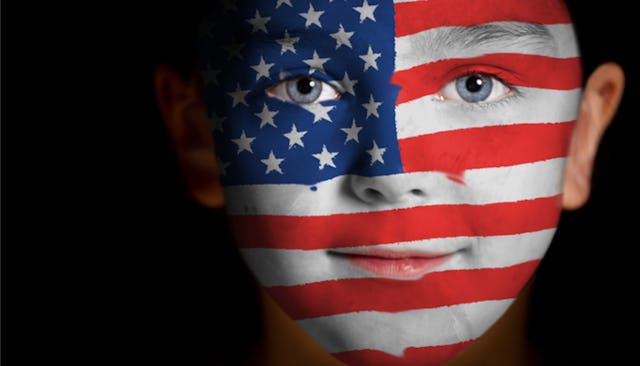What Are We Teaching Our Children When We Say, 'America First'?

I love my country. I feel lucky and blessed to have been born here in the United States of America. I appreciate the benefits afforded me by my American citizenship, and I am grateful for the freedoms guaranteed by our Constitution.
But I don’t think I’m special because I was born here. I don’t believe that America is inherently any more deserving or entitled to safety, security, or prosperity than any other nation. I don’t believe that isolating ourselves from the rest of the world and turning more and more insular is going to do anything to make us safer or “greater.”
And I don’t believe we are teaching our children anything positive when we say, “America first.”
I know the common response to that sentiment is, “Don’t you always put your family first?” That may seem like a logical argument, but there are a couple of problems with it. One, it’s a biological imperative and instinct to put one’s family first. That’s not comparable to nationalistic loyalties. And two, no, I don’t always think we should put our family first. In times of trouble, when my family is better off than another, I would put my family second.
Recall the scene in Little Women when the March girls wrapped up the Christmas dinner they had just laid out to take to a family who was needier than they were. The March family was not wealthy by any stretch, but they decided to put another family’s needs ahead of their own comfort. That’s the kind of selflessness I want to instill in my children. I want them to be altruistic. I want them to help those who need help. And I don’t want that help to only be reserved for people who share our nationality.
If we want to make the comparison of “America first” with “My family first,” then it’s only a small step back to “Me first.” And “Me first” is not something I want my kids to internalize. “America first” also sets up an us vs. them dichotomy that is based on superficial loyalties. The idea that those of us who happened to be born within the same man-made boundaries matter more than those born outside of them seems completely senseless to me.
I was raised to see myself as a citizen of the world. I was raised to see all humanity as one human family. I was raised to believe that a sane patriotism is admirable but unbridled nationalism is harmful. And that’s how I’m raising my kids.
If America were in dire straits, I might feel differently about “America first.” If your family is starving to death, obviously you have to go into survival mode and don’t have much ability to help others. But seriously, that is not our situation. We are the ninth richest nation on Earth, and by far the largest in the top 10. We have the strongest military on Earth and spend more on national defense than the next seven highest-spending countries combined. Our crime rates have fallen significantly since the 1990s. The national debt is an issue, sure, but it’s not like we can’t make our payments. We’re not destitute. We have all of the resources we need to prosper as a whole, but lack the collective and legislative will to address our issues as effectively as we could.
This is usually where someone pipes in with, “But what about our own homeless veterans?” Yes, we’ve actually made some amazing strides on that front. Did you know that between 2009 and 2014, veteran homelessness decreased by 67.4%? In January 2015, New Orleans became the first major city to announce that it had ended veteran homelessness. People keep insisting that such problems are totally out of control, but it’s just not the case.
Basically, we’re living in a really nice house with a few holes in the roof and a few broken windows that we’re working on repairing. So when a family shows up at our doorstep in a blizzard, are we really willing to turn them away because “we need to fix our own house first”? Are we really saying we can’t offer a bit of charity out of our own pockets because we haven’t fully paid off our mortgage yet? Are we not willing to offer a starving stranger a meal because “they’re not our problem” or “they can get help at the neighbor’s house”?
We live in an increasingly globally connected and interdependent world. No country can thrive on its own, including America. Isolationism and focusing solely on our own interests will backfire on us as it alienates our allies, fuels the rhetoric of our enemies, and hamstrings our economy.
But most importantly, “America first” tells our children that our country’s strength as a welcoming and diverse nation of immigrants is a weakness. It tells our children that some lives matter more than others, and that they matter based on geography. It tells them that the happenstance of their birthplace entitles them to greater security and prosperity than kids born on the other side of the world.
That’s not a message I’m willing to send my kids. I will raise them to be world citizens, to put their humanity before their nationality, and to use their identity and privilege as Americans to make the world a better place for all.